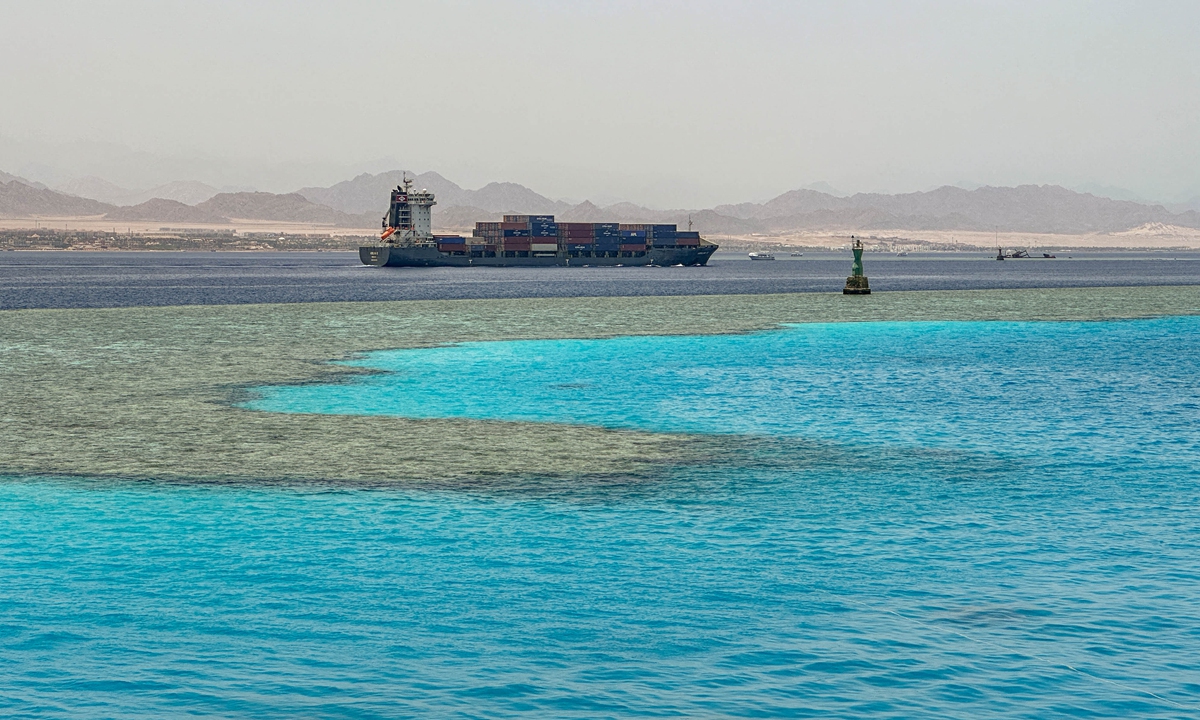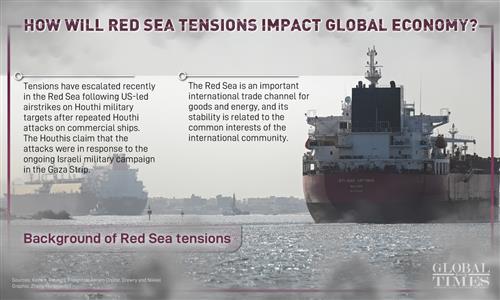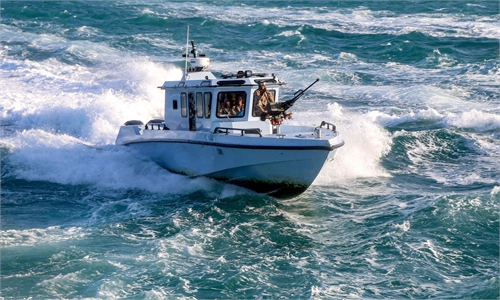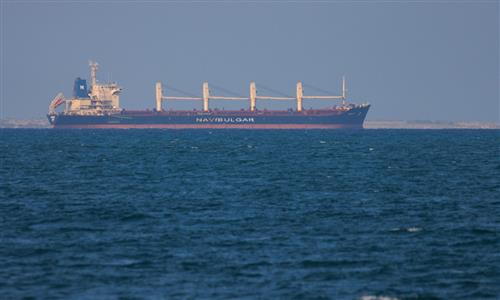China urges relevant parties to avoid adding fuel to Red Sea tension
Military means cannot resolve the Red Sea crisis: experts

A container ship sails in the Red Sea in the Straits of Tiran, in 2023. Photo: IC
With global concerns rising over the prolonged Red Sea crisis, which not only causes a severe impact on shipping routes but also poses risks to the post-pandemic economic recovery, China has called for an end to attacks on civilian ships and urged the parties concerned to avoid adding fuel to the tensions in the Red Sea, as some Chinese experts noted that US military actions are exacerbating the Red Sea crisis.
China has been making active efforts to ease tensions in the Red Sea from the very beginning, having called for an end to the attacks on civilian ships and urged relevant parties to avoid adding fuel to the tensions in the Red Sea, Chinese Foreign Minister Wang Yi said in an interview with the media after concluding his trip to Africa.
During Wang's visit, discussions were held on addressing the spillover effects of the Gaza conflict, particularly on safeguarding the security of the Red Sea navigation channels, Wang said. China calls for an end to the harassment of civilian vessels, and urges relevant parties to avoid adding fuel to the fire, jointly safeguard the security of the sea lanes in accordance with the law, and earnestly respect the sovereignty and territorial integrity of countries bordering the Red Sea, including Yemen.
The structure of the global benchmark Brent crude futures market and some physical markets in Europe and Africa have been reflecting tighter supply partly over concerns about shipping delays as vessels have avoided or tried to avoid the Red Sea due to missile and drone attacks, Al Jazeera reported on Saturday.
US Central Command forces struck a Houthi anti-ship missile prepared to launch and aimed at the Gulf of Aden on Saturday, Voice of America reported on Saturday. It was the US military's seventh strike against Houthi missile launchers in a week.
The White House said the strikes are necessary to protect merchant ships and US Navy vessels in the Red Sea and Gulf of Aden, according to the VOA.
The Red Sea crisis is an international issue that affects global supply chains and the security of maritime trade routes, involving stakeholders from around the globe. Addressing the Red Sea crisis should not involve forming exclusive, small multilateral organizations with "high walls" but rather involve a collective effort to resolve the crisis, Sun Degang, director of the Center for Middle Eastern Studies at Fudan University, told the Global Times on Sunday.
The root of the Red Sea crisis lies in the Palestinian region. Without addressing this root cause, merely attempting to resolve the crisis in the Red Sea is likely insufficient, Sun noted. "The motive behind the Houthi rebels intercepting commercial ships in the Red Sea is to strike against Israel, signaling the need for Israel to resolve the conflict and end the collective punishment of people in the Gaza Strip."
Some experts noted that military means alone cannot resolve the Red Sea crisis. The frequent strikes by the US and Western forces against the Houthi rebels actually lead to the rise of more anti-American forces, including the unification of forces like Iran, Hezbollah in Lebanon, and the Houthi rebels.
"This approach of meeting violence with violence only creates more conflicts and confrontations, escalating the crisis," Sun said.
The spillover of the Israeli-Palestinian conflict is escalating in the directions of Syria, Lebanon and the Red Sea, presenting a coordinated uptick in tensions, Liu Zhongmin, a professor at the Middle East Studies Institute of Shanghai International Studies University, told the Global Times on Sunday.
"The conflict between the US and Israel and the Iran-led resistance front is intensifying, consequently elevating the risk of a direct confrontation between the US and Israel, and Iran," Liu said.
Although neither the US nor Iran desires to be drawn into a large-scale conflict or war, the current trajectory suggests an increasing risk of the US becoming further entangled in Middle Eastern conflicts, Liu noted.
The Palestinian issue remains at the core of the Middle East issue, touching on the peace and stability of the region and testing the moral conscience of humanity, Wang told the media.
China firmly supports the just cause of the Palestinian people in regaining their legitimate national rights and steadfastly supports the long-standing aspiration of the Palestinians to establish an independent state, he said.
However, Israeli Prime Minister Benjamin Netanyahu has doubled down on opposition to an independent Palestinian state, deepening the division between Israel and its allies including the US, as US President Joe Biden said on Friday that he spoke with Netanyahu about possible solutions for creating an independent Palestine state, according to media reports.
"Before a cease-fire in Gaza, it's impossible to launch any negotiations for a two-state solution. For Israel, the most urgent task now is to resolve the Gaza crisis," Liu said.




